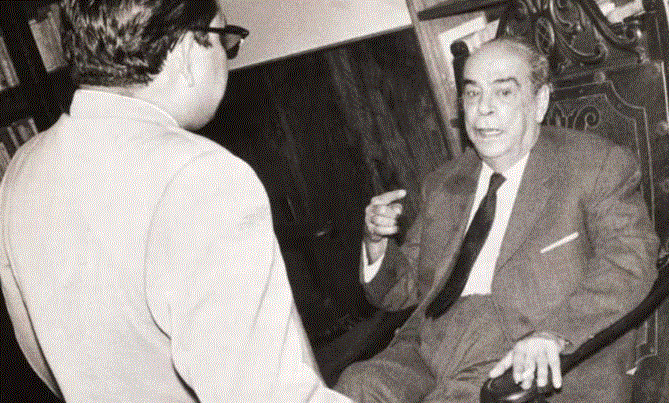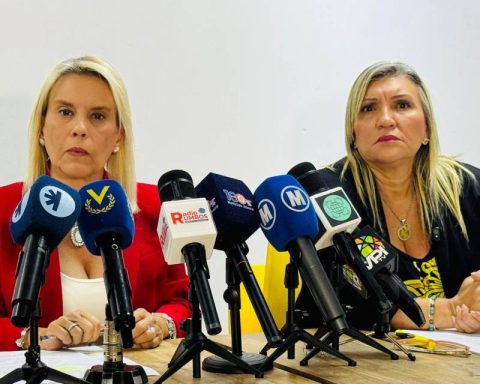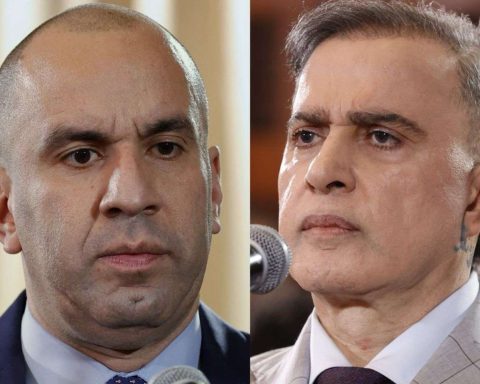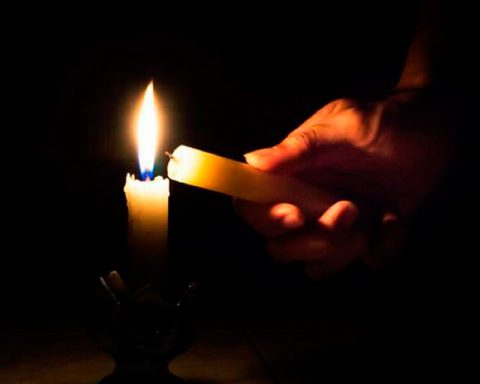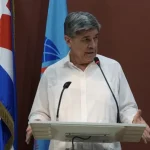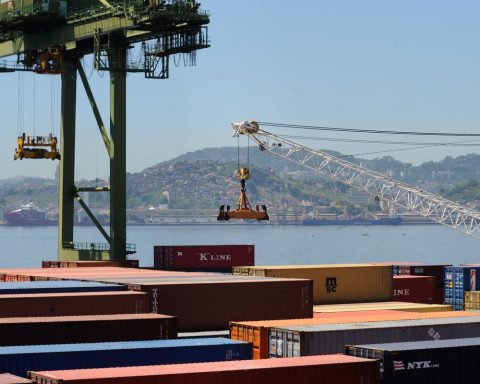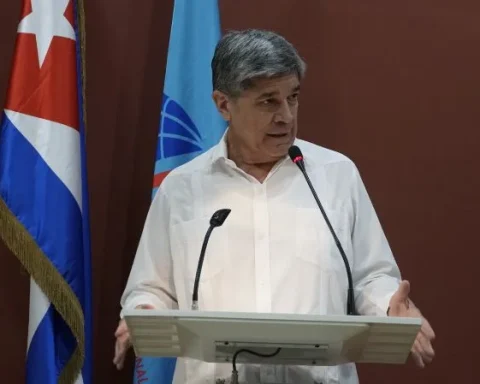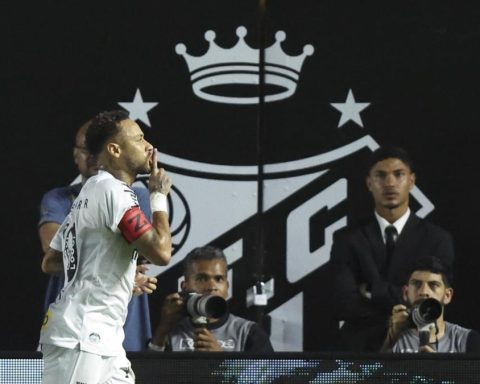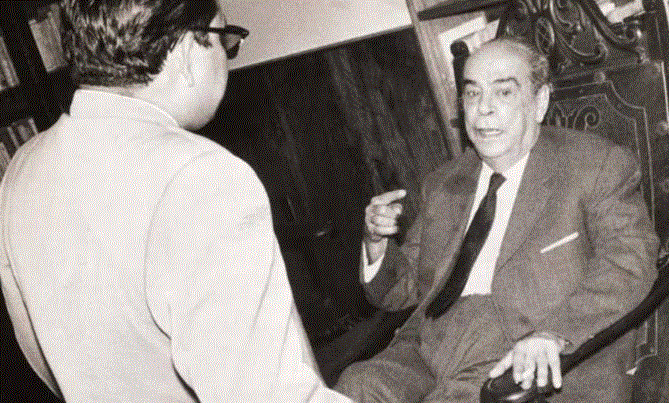
It was the afternoon of December 31, 1955. The plane that was taking me into exile landed at the Mexico City International Airport, arranged by the dictatorship of Marcos Pérez Jiménez. My sister Teresa and her husband, temporarily residing in that city, were waiting for me, as well as some compatriots who had already been exiled previously.
I am informed that it was already customary for leaders of the Venezuelan parties to receive the new year in the house of Rómulo Gallegos. A large and varied representation of exile accompanied the great novelist that farewell night of the year. It was a source of pleasure and honor for me, after seven years had elapsed since the overthrow of his government, to see again the person who, in his novels, set the people walking in search of themselves and their destiny. Given the welcome hugs to the year that had just entered, voices are raised asking “let the teacher Gallegos dance!”, in the midst of the celebratory music that was heard. I vividly remember, as an anecdote, that, to meet the request, the former President asked that the song, very popular at the time, known as “El manisero” be played on the sound system. and the author of Miss Barbara danced, between applause and smiles.
Subsequently, there were many meetings, political analysis and comments or simple social chats, which were shared with Rómulo Gallegos. On May 20, 1956, on the occasion of the first anniversary of the car accident in which the poet Andrés Eloy Blanco lost his life, the Venezuelan exiles held an assembly in the Mexican capital, in which Rómulo Gallegos and Gonzalo Barrios participated. Let us retain part of the speech, which moved us all, by the distinguished novelist: “A year after your light – lend me your beautiful words, Andrés Eloy, so that your imperishable spiritual presence among us may throb in my voice – from the serene clarity that you were , brutally extinguished in one of our darkest nights… The act that we celebrate here today, paying honor to the memory of Andrés Eloy Blanco, is a profession of faith; but it would not be complete or authentic if we limited ourselves to raising praise around the lofty example that he left us without applying our daily conduct to him to copy the elegant way in which he fulfilled his duty until his last moments ».
On September 13, of that same year 1956, Democratic Action (AD) celebrated 15 years of its foundation. The organ of the exiled Venezuelans of Democratic Action in Mexico was the journalistic publication entitled Democratic Venezuela, of whose 15 numbers appeared between 1955 and 1957, José Agustín Catalá made a facsimile edition in January 1983 in Caracas. In number 10 of that publication, there is an extensive commentary on the act of the 15 years that Democratic Action fulfilled, when the dictatorship of Marcos Pérez Jiménez prevailed in the country.
As Rómulo Gallegos, in the speech he gave on that occasion, generously referred to me, I was tempted to suppress such reference, but in order not to incur false modesty with this mutilation, and asking, of course, for the corresponding excuses, I decided transcribe verbatim part of the gloss of the act collected in Democratic Venezuela, what I do in a row: “In Mexico, the party organized a commemorative act of the initial date in the Spanish Athenaeum…Engineer José Luis de la Loma spoke on behalf of Republican Spain…Comrades PB Pérez Salinas did it for the party and Carlos Canache Mata. Mr. Rómulo Gallegos closed with the words that we insert below: ‘In the printed invitations for this event, a typographical error has been made, of including me among the speakers who would take part in it, when in reality I would only come to fulfill the unavoidable obligation of the act of presence in the commemoration of the initial date of the political party to which I belong –it was fifteen years ago yesterday- and to pronounce just the closing words of this meeting. Because those of Democratic Action were already well entrusted to Pedro Bernardo Pérez Salinas, authentic representative on the anniversary date of the incorporation of the working class to the full and conscious exercise of political rights and to Dr. Carlos Canache, of the brilliant and fiery portion of intellectuality and youth that our paintings contain – without this meaning that I do not recognize my dear colleague Pérez Salinas or brilliance of intelligence, that his intelligence is well cultivated through meritorious disciplines, nor fires of youth, although he hides them well. They have expressed the thought and suffering of Democratic Action that for eight years have been filling the anti-human prisons of Venezuela or there it moves maintaining the spirit of resistance in the shaky shelters of the clandestine or under cover of other sheltering flags of dignity, as here that of generous Mexico, we endured exile’ ”.
One day of that year 1956, the enlightened Master approached me and told me that Dr. Rafael José Nery, also residing in Mexico, had ordered him to rest for 15 days, due to having diagnosed him with a hypertensive crisis, and that he be controlled. daily blood pressure and temperature, and that he (Dr. Nery) would go at night to see the results and verify the evolution of his state of health. He asked me if he could do such a control (I was a recent graduate doctor, then I got my law degree), I replied that it would be an honor for me. Every morning, for 15 days, I completed the task. On the third day he wanted to refer extensively to the November 24 coup that overthrew the constitutional government he presided over. I remember that, words more, words less, the writer told me: “The Minister of Defense, Lieutenant Colonel Carlos Delgado Chalbaud, did his best to prevent the coup, but realizing that it was inevitable, he yielded to Pérez Jiménez and it was lost to history; he was a passive traitor, not an active traitor.” It must be remembered that Delgado, after the death of his father on the expedition of the falke against Juan Vicente Gómez in 1929, he was welcomed in the house of Rómulo Gallegos when he lived in exile in Barcelona, Spain, and he protected him like a son (he asked for his blessing). Although many in the national political leadership believe that the writer is generous in judging Delgado’s conduct in the events of November 24, most historians maintain that he is not, and even Pérez Jiménez himself has reported that, when the blow was posed, “at first Delgado went on to say that we had to see, wait, endure. We made him see that we couldn’t wait any longer and in short we told him: either you assume the leadership or we will be forced to remove you… Finally he was convinced and said: I’ll go with you, we’re going to proceed. And then it was ordered from the natural commanders of the Armed Forces to take the necessary military measures to change the government of AD” (Agustin Blanco Muñoz (1983). The General speaks. Caracas. Editorial Jose Marti. P. 79-80). Moreover, Juan Liscano, in his book Rómulo Gallegos and his time (Monte Avila Editores CA /1969/Pág. 178), writes: “Transferred (Gallegos) from his home to the Military School, he was detained by the felon General Staff. The governor of Caracas, General Celis Paredes, visited him one day, in a friendly but also veiled semi-official manner. It is about finding what to do with the illustrious detainee. Celis Paredes asked him if he would like to return to his home in Los Palos Grandes. Gallegos understood that behind that question was Commander Delgado Chalbaud, whose determination during the crisis had been to ensure that Gallegos remained as president, but folded to the insurgent General Staff (that is, accepting the conditions that were intended to be imposed, my note , from CCM). The novelist president’s response left no room for doubt: ‘Tell your commander that until April 19, 1953, in Venezuela, there are only two places for me: the presidential palace or jail.’
Rómulo Gallegos died at 2:20 a.m. on April 5, 1969, in the arms of his children Sonia and Alexis. Twenty-five years after his death, the Senate of the Republic unanimously agreed to transfer his mortal remains to the National Pantheon, where the open cenotaph awaits them. He continues to share, in the General Cemetery of the South of Caracas, a common grave with Doña Teotiste, his beloved wife. He had asked her daughter, Sonia, that as long as she was alive, she would not allow him to be separated from her. For this reason, the cenotaph does not yet contain the remains of the illustrious novelist.
